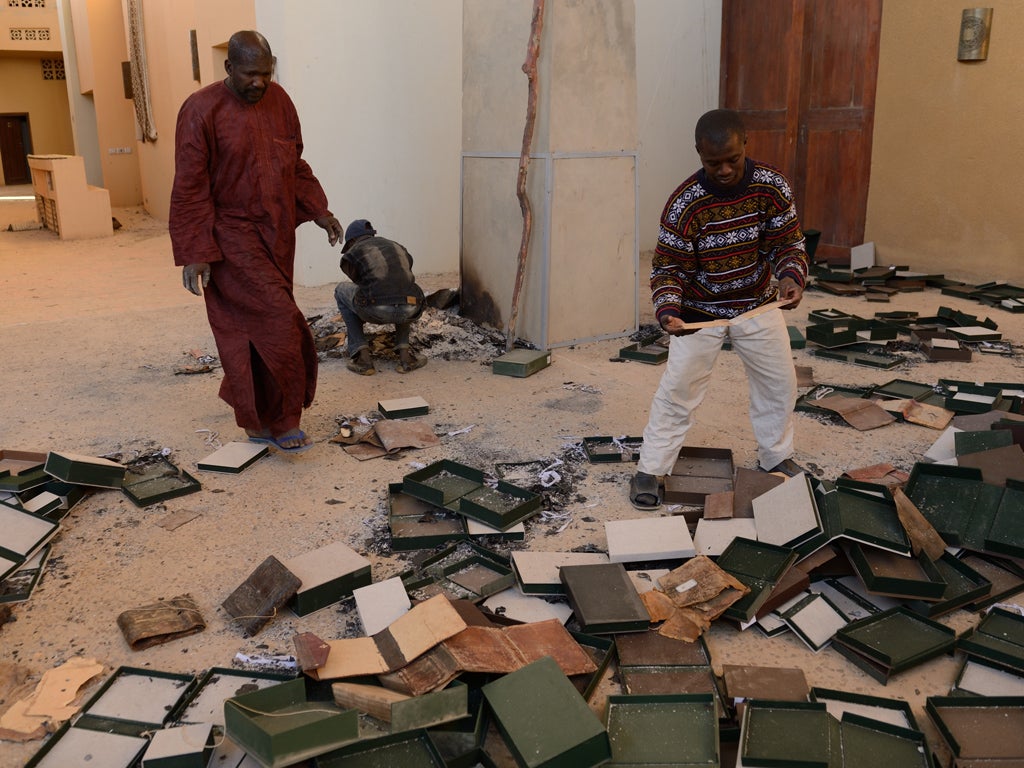The Independent's journalism is supported by our readers. When you purchase through links on our site, we may earn commission.
From the Papal monasteries to Timbuktu, absolutism lives on
For the Salafists, a Muslim shrine is a rival to God as surely as Henry VIII saw the monasteries as a Papal rival


“Then I crushed it and ground it to powder as fine as dust…” – exactly, I imagine, what the Islamic zealots were thinking as they trashed ancient manuscripts in Timbuktu last week.
Or indeed what the Taliban’s munitions men had in mind when they blasted the Buddhas of Bamian to bits in 2001. Only the quotation comes not from the Koran or the Hadith of the Prophet Mohamed, but from the Holy Bible, Deuteronomy 9:21. I’m afraid to say that in the religions of Abraham, idolatry is a statue-smasher, a stained glass window- breaker, a shrine-destroyer, a book-burner.
True, the Saudis have already bulldozed graves of the early Islamic era. But didn’t Oliver Cromwell’s troops pull out the bones of the knights of Kilkenny and hurl them into mass graves, all the while hacking off their carved stone heads from their tombs? All golden calves must be immolated. And if cosmopolitan art and culture are symbolic of a hated multi-ethnic world, then surely this explains why I discovered on the floor of the burned-out Sarajevo library only the card-index files of books in the failed pre-war European ‘language’ of Esperanto.
Odd how Mohammed Ibn Abd al-Wahhab, who became the 18th Century philosophical high priest of the future Saudi kingdom and the Sunni world’s principle enemy of graven images, was so unpopular. The Iraqis of Basra allegedly chucked him out of town - even his own brother condemned him - but the beliefs he bequeathed to the house of Saud have survived. Fight corruption but never kill the king, which means that King Abdullah of Saudi Arabia and his family are safe, at least until he dies of old age. Quite a sword to live under.
Yet Wahhabism remains the Salafist creed, a Sahara Puritanism that Cromwell’s army could only dream of. Read the first chapter of Lawrence’s Seven Pillars of Wisdom and you’ll find the most compelling explanation of this harsh, self-destructive absolutism. Infinitely sad, totally uncompromising, a belief sucked from the colourless sands and the sword-like heat of the desert. God cannot tolerate any partner, any rival, and thus the Arabic ‘shrk’ – the act of ‘sharing’ – has come to represent iconoclasm which, at its most extreme, means that no bust, no written page, no decorated grave may distract us from the worship/fear/abstraction and anger of God. Teach this to the illiterate, the poor, the lost souls of war - and they will tear down the gates of the Sufi saints, and view the libraries of Timbuktu as idolatrous as the torn mobile phone posters and scratched safe-sex advertisements which my colleague Daniel Howden witnessed in the city last week.
The Islamists of northern Mali, many of whom are indeed Malians - with an added cocktail of al-Qa’ida desperadoes to quicken the fury of the West - smash their own cultural history with the same abandon as the Islamists of Nigeria burn churches. For the Salafists, a Muslim shrine signifies a rival to God, as surely as Henry VIII saw the monasteries as a Papal rival of his own supreme leadership of the church in England. The Taliban regarded the representation of any human form as corrupt; so, too, the English Puritans regarded the wondrous stained-glass windows of the Middle Ages.
The Saudis have shown contempt for the Shia as well as Sunni shrines of the Kingdom. They even helped destroy a few in Bahrain after the Shias on the island staged their forlorn 2011 revolt. We shall not contemplate the pulverised Shia basilicas of Iraq. Nor can the one God who rules over both Christians and Muslims protect their heavenly creations or their places of worship. Croatian Catholics shelled the Ottoman – and thus Muslim – bridge of Mostar into the Neretva river. And that same Balkan slaughterhouse consumed the 18 century mosques of Banja Luka – blown up by Serb Orthodox militiamen – and the old Muslim graves of the Drina Valley, as surely as the Muslim Azerbaijanis have smashed the decorated Armenian Christian graves along their common border. The churches of northern Cyprus have been destroyed under the eyes of the UN; so have the Orthodox houses of religion in Kosovo. The 14 century monastery of St Kosma was reduced to rubble by the Muslim Kosovars.
The destruction of the monastic libraries in the British Isles and the dissolution of the mother houses – how perfect were their ruins for Turner and his fellow artists – remain a disfiguring scar on our history. No, this does not excuse the Salafist pillage, any more than it does the peasant ignorance of the Taliban - who would literally hang television sets from gallows in Afghanistan while approving the smashing of their own nation’s artefacts.
But that is the point. The Taliban recognised their ‘nation’ only as a mini-caliphate, a Saudi-funded experiment in Salafi state-building, in which humiliation of the West – of our armies and of our predilection for ‘heritage’ at the expense of human suffering – becomes proof-positive of Islam’s superiority. How many Muslim institutions – a dangerous question, this – have condemned the Timbucktu book-burning or the Sufi shrine-bulldozing? For what is parchment in comparison to the majesty of God – especially when a god belongs only to the most self-regarding, the most irredeemable and most isolated of believers, grinding his rivals to powder as fine as dust?
Buy the new Independent eBook - £1.99 Two decades of reportage on a tragic conflict the West can no longer afford to ignore - by one of the world’s great foreign correspondents
Join our commenting forum
Join thought-provoking conversations, follow other Independent readers and see their replies
Comments
Bookmark popover
Removed from bookmarks